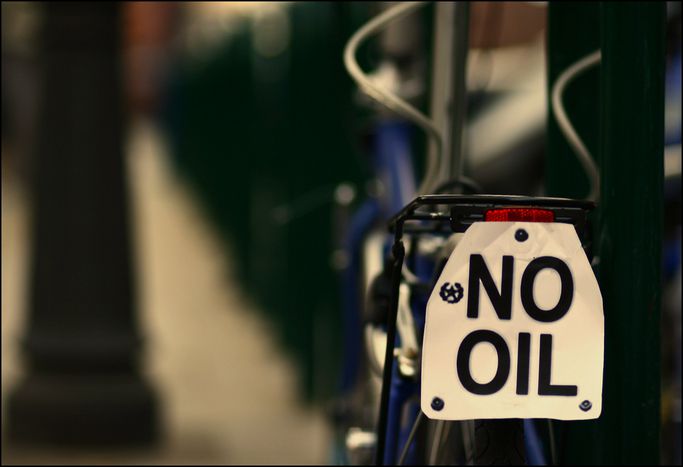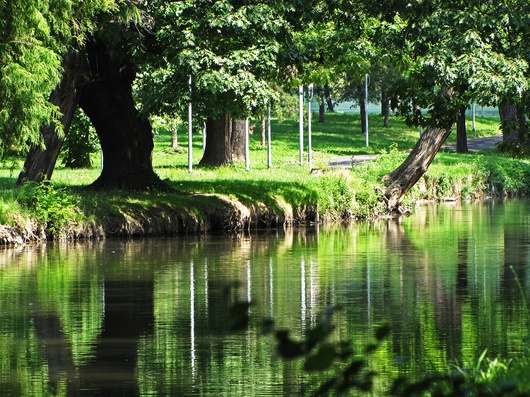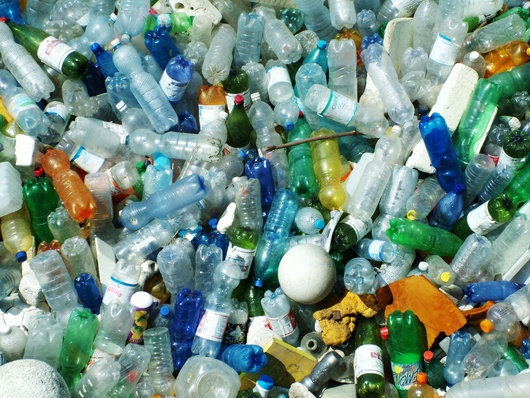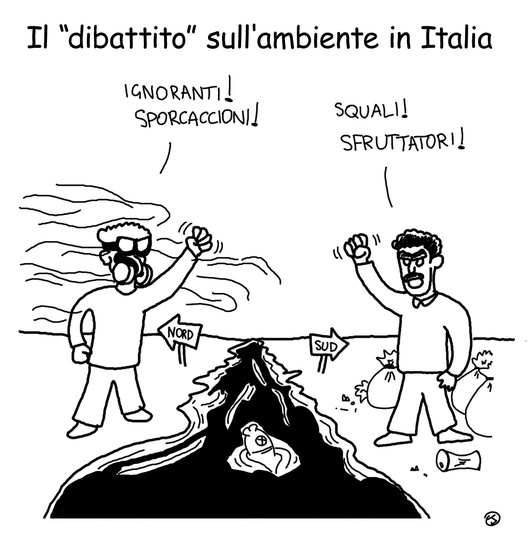
Petrol in Padana Plain: ins and outs of Italy's February ecological disaster
Published on
Translation by:
 Danielle Goshawk
Danielle Goshawk
A large black tide of fuel invaded the Lambro river near Milan when unknown saboteurs released tons of diesel oil into the waters of this small tributary of Italy’s longest river. What are the consequences for one of the richest and most polluted areas of the northern part of our ‘beautiful country’?
On the night of 23 February, unidentified intruders broke into the former oil refinery, now used as a storage depot, of Lombarda Petroli (Lombardy Petroleum) in Villasanta near Milan, and opened the cisterns releasing the fuel into the plant’s courtyard. Incredibly, the drains in the courtyard are directly connected to the public sewer system and to the river Lambro, located nearby, which was thus invaded by a black tide of oil.
Environmental disasters: Galicia, Lombardy
 Fortunately, this environmental disaster is not on the same scale as that of the Prestige, in which 63, 000 tons of oil leaked into the waters off the Galician coastline in 2002. In this case, it is estimated that between 2, 000 – 3, 000 tons of oil and diesel were released. Nevertheless, at around 170 cisterns it is not an inconsiderable amount.
Fortunately, this environmental disaster is not on the same scale as that of the Prestige, in which 63, 000 tons of oil leaked into the waters off the Galician coastline in 2002. In this case, it is estimated that between 2, 000 – 3, 000 tons of oil and diesel were released. Nevertheless, at around 170 cisterns it is not an inconsiderable amount.
It is a major cause for concern since the Lambro runs 80km through the Padana Plain (Pianura Padana), before joining the southern part of it, which is called the PoValley; it's Italy and southern Europe’s biggest river. Padana Plain's waters are used to irrigate fields of corn, wheat, rice and beet, which is vital to the region’s agriculture. A small zone, known as the ‘bassa’, relies heavily on agriculture and on raising livestock, which is also fundamental to the region. The giants of the Italian food and agriculture industry are based in the ‘bassa’: Barilla, Parmalat and the Cremonini group (meat suppliers to McDonald’s Italy). World famous Italian products are also produced here: various types of salami (salami, bacon and ham), Parmigiano Reggiano (parmesan cheese) and Grana Padano (a traditional cheese). As such, there is great concern for the potential consequences of the pollution of the rivers which represent a vital resource for such an important sector of the national economy.
Padana Plain's fortune lies mainly on the plain
Luckily, the immediate danger appears to have passed thanks to the intervention of the civil protection and environment agency (Protezione Civile), the fire brigade and the army. 'Most of (the oil) should have been filtered; at the moment, the sludge is not arriving in large amounts,' according to a civil protection agency member who is in charge of the Po clean-up operation.
The sewerage of 700, 000 inhabitants will be released directly into the river
But uncertainty still reigns over the long-term effects of the oil on the ecosystem and the possibility of hydrocarbons being deposited on the riverbeds. The water pollution is not limited to the direct effects of the oil spillage. In fact, when the oil reached the water treatment plant on the Lambro in the city of Monza, it killed all of the micro-organisms that treat the water. As a result, the water treatment plant will remain closed for a month. During this time the sewerage of 700, 000 inhabitants will be released directly into the river.
 Historically, the Lambro is one of the most polluted rivers in Italy. 'It has suffered from industrial contamination for the last 30 years,' explains Barbara Meggetto, the Lombardy regional representative of the Legambiente ('league for the environment') group. 'In recent years, the situation had improved due to the construction of the (25km) Lambro valley park,' she says. 'Now it is in danger of returning to how it was thirty years ago.' The final stretch of the river passes through fields and farm houses, but where the sabotage took place, the Lambro flows through an area of continuous factories, hangars, houses and motorways. Milan is one of the most densely built-up areas in Europe and one of the most important centres of production in the country. Along with other important industrial areas in the northeast and northwest, the Padana Plain is the economic hub of Italy. This obviously has an impact on the environment and on the health of the people who live there. But until now the concerns have been over poor air quality; indeed, the entire Po region shares the title with Belgium and Holland as being the area worst affected by air pollution.
Historically, the Lambro is one of the most polluted rivers in Italy. 'It has suffered from industrial contamination for the last 30 years,' explains Barbara Meggetto, the Lombardy regional representative of the Legambiente ('league for the environment') group. 'In recent years, the situation had improved due to the construction of the (25km) Lambro valley park,' she says. 'Now it is in danger of returning to how it was thirty years ago.' The final stretch of the river passes through fields and farm houses, but where the sabotage took place, the Lambro flows through an area of continuous factories, hangars, houses and motorways. Milan is one of the most densely built-up areas in Europe and one of the most important centres of production in the country. Along with other important industrial areas in the northeast and northwest, the Padana Plain is the economic hub of Italy. This obviously has an impact on the environment and on the health of the people who live there. But until now the concerns have been over poor air quality; indeed, the entire Po region shares the title with Belgium and Holland as being the area worst affected by air pollution.
Seveso and EU: taking care in the future
 The current situation was clearly not the product of an accident. The 2002 sinking of the Prestige and its oil spillage in Spain brought the lack of security measures on the Atlantic coast to the fore, whereas in this case we find ourselves facing a clear inefficacy in environmental protection measures. In fact, under the Seveso directive (named after a town located a few kilometres from Milan which suffered an environmental disaster in the 1970s after the escape of a dioxin cloud from a chemical plant), the ex-refinery should have been submitted to stringent European regulations. But nobody carried out the necessary procedures.
The current situation was clearly not the product of an accident. The 2002 sinking of the Prestige and its oil spillage in Spain brought the lack of security measures on the Atlantic coast to the fore, whereas in this case we find ourselves facing a clear inefficacy in environmental protection measures. In fact, under the Seveso directive (named after a town located a few kilometres from Milan which suffered an environmental disaster in the 1970s after the escape of a dioxin cloud from a chemical plant), the ex-refinery should have been submitted to stringent European regulations. But nobody carried out the necessary procedures.
There is no sense in accusing the ‘backward’ south of being the only ones with environmental problems, such as the early 2008 rubbish piles in the streets of Naples or Palermo in June 2009, or Croatia's Pula with its multitude of reinforced concrete buildings. What has happened today has brought the harsh reality home to the people of Lombardy: the ‘modern’ north which looks towards Europe and which is organising the Expo Italia 2010 is still afflicted by typically ‘Italian’ problems.
Images: ©JFabra, BrancaleoneDaLecce, Latente; courtesy of Flickr/ video by jacopomarazia/ Youtube
Translated from Petrolio in Val Padana: un disastro ecologico italiano


